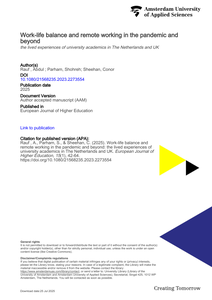Generation Z (Gen Z) will account for a growing proportion of the global workforce in the coming years. Therefore, it is vitally important to understand this generation’s unique perspectives and preferences regarding work. This exploratory study examines the prioritisation and desirability of Gen Z work values according to respondents’ nationality. Data for this study was collected through a survey among 1188 undergraduate students enrolled in one university each in China, Germany, the Netherlands and Thailand. ANOVA test and Tukey post-hoc analysis were used to find out the difference between the groups based on nationality. Findings indicate nationality serves as a key differentiator in work value preferences. The findings challenge the concept of a global Generation Z as only two of the measured values, learning and visible results, were found to have universal appeal across the nationality groups. Despite increased levels of global interconnectedness and accompanying crossvergence of values, the results show significant statistical differences in work values based on the respondents’ nationality. Due to the scope and explorative design of the present study, it cannot be certain that the findings are exclusively from Gen Z characteristics or influenced by other, non-cultural, variables. This study suggests there is a need for study programmes at a tertiary level to embed experiential learning components and individual study pathways in their curricula to enable students to develop realistic expectations about the workplace and their place in it. In turn, these programmes will be able to develop a competitive advantage in HE landscape. The insights gained can be leveraged by internationally oriented study programmes, such as International Business (IB), to better address Gen Z needs and expectations.
MULTIFILE

Hoofdstuk in The history of youth work in Europe and its relevance for youth policy today. Youth work in the Netherlands goes back a long way and since the 1970s has taken on a rather strong professional image. During the last decades, it went through some hard times, but recently it has undergone a revival and revaluation. (Griensven & Smeets, 2003). The first section of this paper is about how the characteristics of the Dutch affect social work and youth work concepts. The second part discusses the Dutch framework for youth work: definition, fields of activities, core tasks and the ambiguous relationship between youth work and social work. The third section deals with the history of youth work. The paper concludes with a reflection on the future directions that youth work could take. The article is based on Dutch historical research, some by the author, and the author’s involvement in youth work, both as a youth worker and editor- in- chief of the semi-scientific journal Jeugd en samenleving.
DOCUMENT

Poor work-life balance (WLB) has been linked to negative outcomes such as increased stress, anxiety, depression, and a perceived reduction in the overall quality of life. At an institutional level, these may include lowered employee commitment and decreased productivity at work. The advent of COVID-19 has necessitated fundamental alterations to work experience and the ways in which WLB may be perceived. This phenomenological study employed qualitative, in-depth interviews to explore higher education academics’ lived experiences of remote working and how they perceived this had impacted their well-being (WB) and WLB. Using purposive samplings, respondents were drawn from HE sectors in the Netherlands, and the UK. The findings offered an understanding of how remote and hybrid teaching delivery during the pandemic affected academics’ actual experiences of WB and WLB. These findings serve to enhance policymakers’ understandings of significant occupational health and WB issues within a post-pandemic education service paradigm.
DOCUMENT
